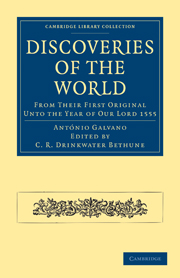Book contents
- Frontmatter
- PREFACE
- TRATADO
- THE EPISTLE DEDICATORIE
- FRANCIS DE SOUSA TAUARES VNTO THE HIGH AND MIGHTIE PRINCE DON JOHN DUKE OF AUEIRO
- DISCOVERIES IN DIFFERENT TIMES AND SEASONS, AND ABOUT THOSE WHO FIRST NAVIGATED
- THE FIRST BEGINNING OF THE DISCOUERIES OF THE SPANYARDS, WITH THE CONTINUATION OF THE DISCOUERIES OF THE PORTUGALS
FRANCIS DE SOUSA TAUARES VNTO THE HIGH AND MIGHTIE PRINCE DON JOHN DUKE OF AUEIRO
Published online by Cambridge University Press: 10 November 2010
- Frontmatter
- PREFACE
- TRATADO
- THE EPISTLE DEDICATORIE
- FRANCIS DE SOUSA TAUARES VNTO THE HIGH AND MIGHTIE PRINCE DON JOHN DUKE OF AUEIRO
- DISCOVERIES IN DIFFERENT TIMES AND SEASONS, AND ABOUT THOSE WHO FIRST NAVIGATED
- THE FIRST BEGINNING OF THE DISCOUERIES OF THE SPANYARDS, WITH THE CONTINUATION OF THE DISCOUERIES OF THE PORTUGALS
Summary
Antonie Galuano vpon his death bed left vnto me in his testament among his papers this booke. And because I am certaine he ordained it to bee presented vnto your Grace, I have thought good herein to fulfill his wil and testament, though in other things I have done nothing, the fault remaining not in me. And by all reason this treatie ought to be set foorth by a Portugall, seeing it intreateth of the variable waies from whence the pepper and spices came in times past into our partes, and also of all the navigations and discoueries in the old time. In both of which things the Portugals have most trauailed. In this treatie and in nine or ten bookes of things touching Maluco and India (which the Cardinall willed me to give to Damian de Goes, saying that he should content me, for otherwise I could not deliuer them) this true Portugall occupied himselfe against the vnfortunate and sorrowfull times which he had been in (which were all ended before all our daies and times): for when he received the captainship and fortresses of Maluco, all the kings and gouernours of all the ilands about being agreed to make war against the Portugals, vntill such time as they might drive them all out of the countrey, he fought against them all with onely 130 Portugals, when they were all together, and strong in Tidore; and he gave them the ouerthrow and killed their king, and one Ternate, the principal author of that war, and he tooke from them their fortresse: so upon this victorie they submitted themselves, and came under the obeisance and service of our King of Portugall.
- Type
- Chapter
- Information
- Discoveries of the WorldFrom their First Original Unto the Year of our Lord 1555, pp. 9 - 16Publisher: Cambridge University PressPrint publication year: 2010First published in: 1862



